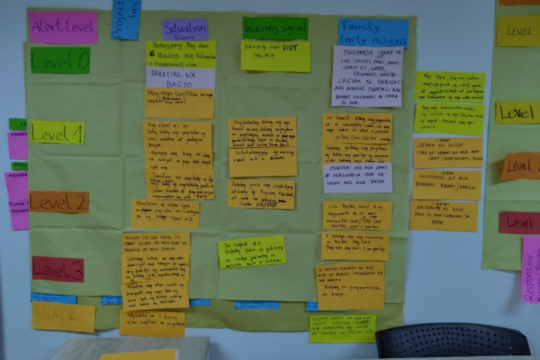Reviewing and Updating Policies for Preparedness
The Preparedness Partnership of Cambodia (PPC) facilitated the revision and dissemination of an updated National Contingency Plan (NCP) which focuses on flood preparedness and incorporated inputs from a wider range of stakeholders including civil society organizations (CSOs) and the private sector. The review process was the first time that these stakeholders came together to develop a more comprehensive plan. The update process was presented at the Ignite Stage of the Global Platform for Disaster Risk Reduction (GPDRR) 2022 conducted in Bali, Indonesia by His Excellency (H.E.) Prak Kim Hong, Deputy Secretary General, National Committee for Disaster Management (NCDM).
Learning through Exercise
A Simulation Exercise focused on field data collection and assessment was conducted in Kampong Cham province on 16 May 2022. It was led by NCDM with support from the PPC secretariat. The event witnessed 45 participants (40 males, 5 females) from the Provincial Committee for Disaster Management (PCDM) from Kampong Cham, Kratie, Kampong Thom, Pursat, Stung Traeng, and Rattanakiri provinces as well as Cambodia Humanitarian Forum (CHF) and Federation of Associations for Small and Medium Enterprises of Cambodia (FASMEC). The simulation exercise served to reinforce the work to operationalize support for local emergency response teams.
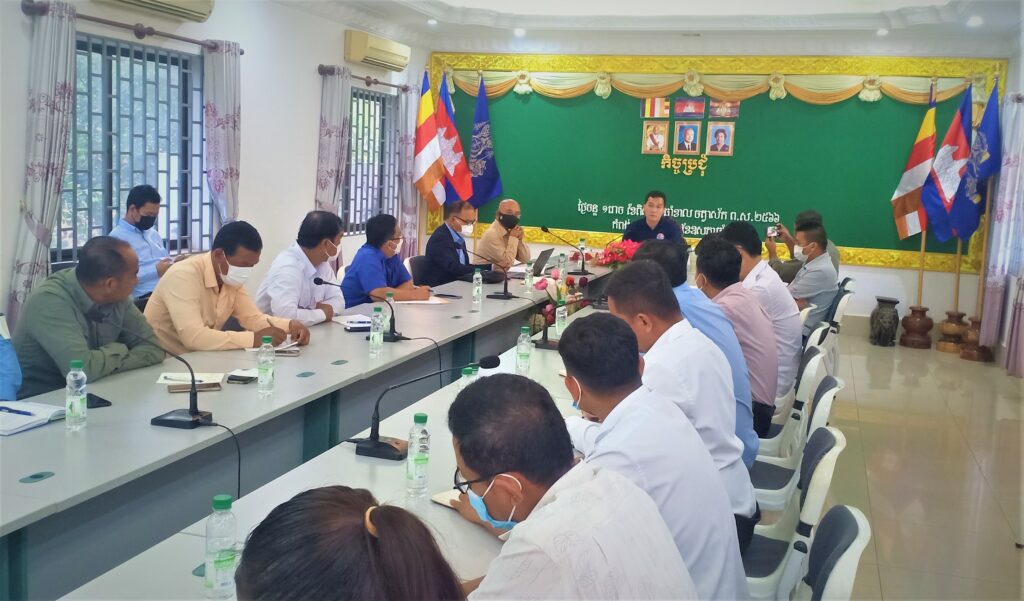
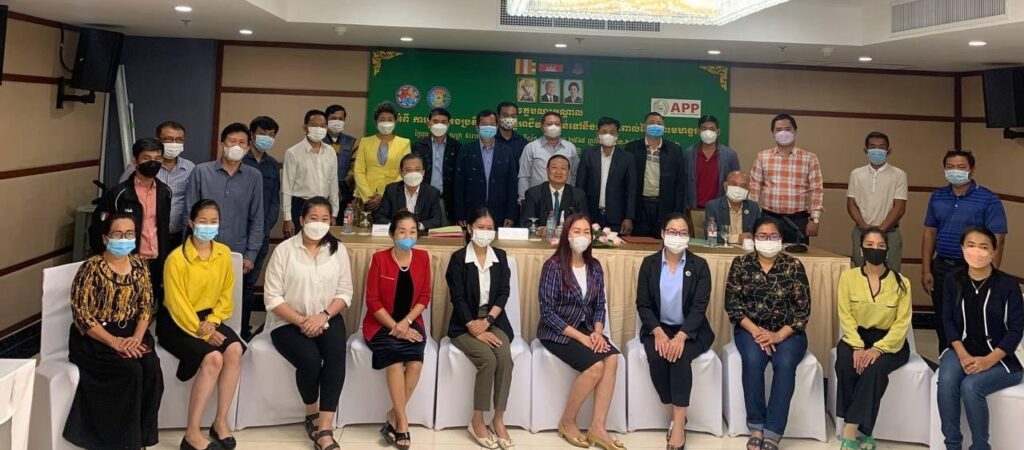
Investing in Better Businesses
PPC and FASMEC are collaborating for greater engagement of the private sector in disaster preparedness in Cambodia, with a particular focus on small and medium enterprises (SMEs). These efforts included a three-day training on Business Continuity and Business Resilience held in Phnom Penh on 23 – 25 February 2022. There were 39 participants (22 males, 17 females) who were FASMEC’s SME partners at the training. Business continuity and business resilience are relatively new concepts in the national context and most SMEs are not familiar with them. The materials for the training were adapted and translated from materials provided by the Asian Disaster Preparedness Center (ADPC) which had been developed for use in other APP program countries.
Capacity Building Course on Inclusive Approaches
ADPC, PADEK in close collaboration with NCDM organized a Rights-Based and Inclusive Approach to Early Warning, Evacuation, and Camp Management training on 15-16 September 2022 with support from Swedish International Development Cooperation Agency (Sida). There were 37 representatives (33 males, 4 females) participating from the CSO and private sector
The key objectives of the training were the following:
- explain the four elements of a rights-based and inclusive approach,
- apply the four elements when evaluating existing early warning, evacuation, and camp management measures from the local to the national level,
- apply the four elements when designing early warning, evacuation, and camp management measures from local to the national levels, and
- co-develop training materials of relevance to actors at the local level in the country
This training is a part of capacity strengthening to enhance APP’s national capacity in regard to the locally-led actions in disaster preparedness for response and recovery. The course provided much more knowledge and practical experiences concerning the legal and policy framework for emergency relief align with international law and human rights. The participants will improve their interventions and way of working through the knowledge. They will also draw attention to designing evacuation and camp management plans with considering related to law and human rights standards “leaving no one behind” by applying a rights-based and inclusive approach.
Lessons Learned Workshop
PCC and NCDM work in close collaboration with CHF and FASMEC conducted a lessons-learned workshop on 29 June 2022. There were 50 (33 males, 17 females) participants on the first day and 35 (26 males, 9 females) participants on the second day for the field visit to the Sothnikum district. The workshop focused on sharing lessons learned and innovative experiences of locally-led DRM actions and sharing ideas, opinions, and recommendations to maintain and improve proactive coordination and collaboration mechanisms in effective ways for future actions. It involved participatory discussion activities on the achievement, challenges, and improvements. The recommendations from the workshop included enhancing the broadcast 1294 system, requesting additional training for the private sector, improving dissemination of disaster awareness to the community, creating refresher training courses and continuing the fundraising efforts, and approaching more donors.
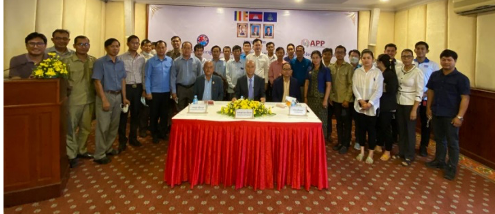
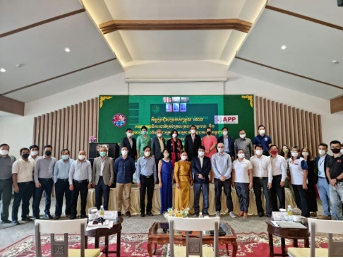
Multi-Stakeholder Coordination Meeting
PPC organized a multi-stakeholder Joint Post-Monsoon Coordination Meeting was organized with HRF and JAG on 21 February 2022. This event also engaged NCDM, and partners on disaster management in Cambodia on in Phnom Penh.There were 46 (33 males, 13 females) participants including NCDM, CHF, HRF, JAG, and ADPC representatives. The objectives of the meeting were to promote effective coordination for the implementation of DRR and Emergency Preparedness and Response (ERP) activities among partners and improve information sharing, resources, and knowledge management on disaster management. This meeting witnessed the attendance of H.E. Lam Heng Huot, Vice-President, and Secretary-General of NCDM, and Mrs. Elizabeth Pearce, Save the Children Country Director, and JAG’s Co-Chair. It was the first coordination meeting in 2022 that provided an opportunity to strengthen coordination between NCDM and important humanitarian partners in Cambodia such as HRF, JAG, CHF, and FASMEC. The achievements and lessons learned from 2021 and plans for 2022 and the following years’ which were shared in the meeting were very useful to inform and generate further discussion to strengthen coordination for disaster and emergency preparedness in Cambodia. The coordination in preparation to conduct the rapid assessment for floods in 2022 and other hazard scenarios was considered very important as Cambodia is heavily affected by flooding events. The effective joint rapid assessment would enable relevant humanitarian partners to identify the impact and needs of the affected people and to identify immediate response plans and early recovery intervention. There will be further ongoing discussion to see how the information from the rapid assessment could complement the PRISM.
